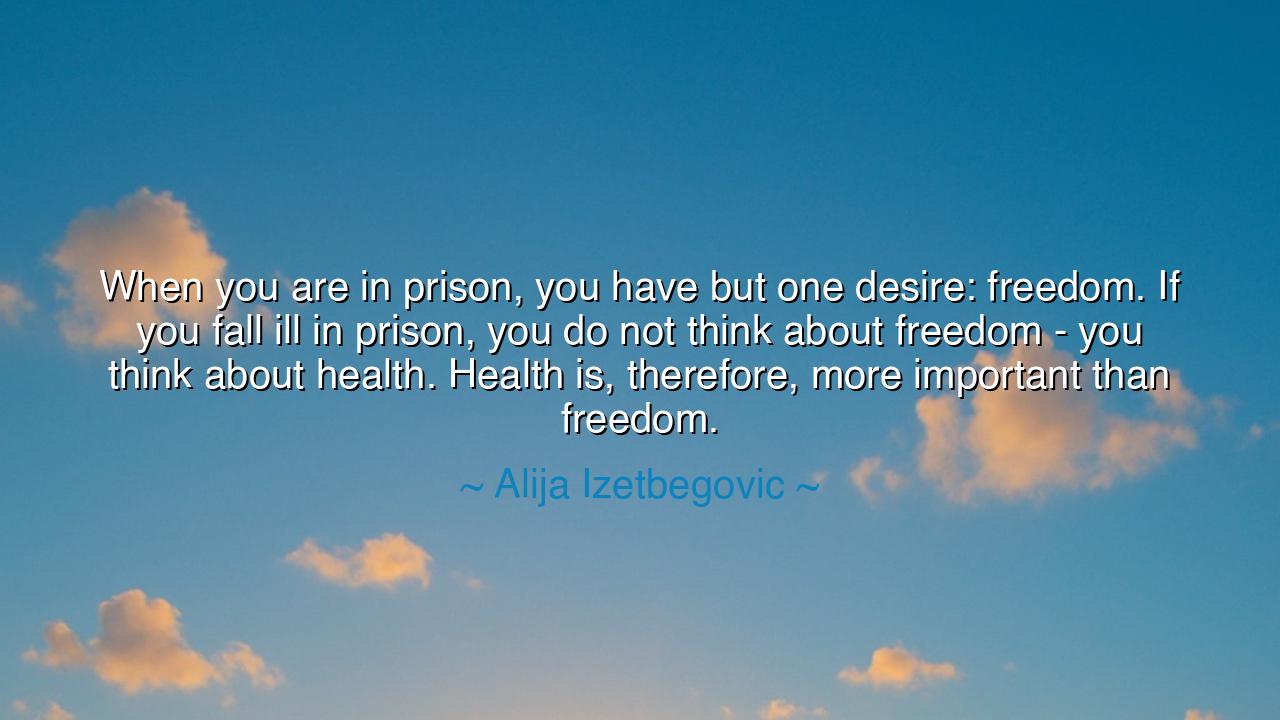
When you are in prison, you have but one desire: freedom. If you
When you are in prison, you have but one desire: freedom. If you fall ill in prison, you do not think about freedom - you think about health. Health is, therefore, more important than freedom.






In the profound words of Alija Izetbegović, the philosopher, statesman, and the first President of independent Bosnia and Herzegovina, we encounter a truth as ancient as humanity itself: “When you are in prison, you have but one desire: freedom. If you fall ill in prison, you do not think about freedom — you think about health. Health is, therefore, more important than freedom.” These words, drawn from a man who endured both imprisonment and suffering, are not the idle reflections of comfort, but the hard-earned wisdom of experience. Izetbegović wrote these lines during his time as a political prisoner — a man deprived of liberty, stripped of rights, yet still capable of seeing deeper into the nature of life than most who walked free.
In his sentence lies a lesson in perspective, the shifting hierarchy of human needs that only suffering can reveal. To the man in chains, freedom is the dream that keeps the heart beating. But when illness enters — when the body weakens and breath becomes a struggle — the flame of that dream flickers. The mind, once filled with visions of liberation, now longs for something simpler, purer: the strength to stand, the relief of breath, the gift of health. Thus, Izetbegović teaches that health is not a luxury but the foundation of all desires. Without it, even freedom loses its sweetness, for what use is liberty to one too frail to live it?
The ancients, too, understood this truth. The philosopher Epicurus, though often misunderstood, taught that the first condition of happiness is the absence of pain. The Stoics, in turn, believed that the body’s trials test the soul’s endurance — yet even they, in their valor, admitted that illness humbles even the strongest will. Health, they knew, is not merely the well-being of the flesh, but the harmony of the whole being — body, mind, and spirit. To lose it is to lose the foundation upon which all virtues stand. Thus, when Izetbegović says that health surpasses freedom, he is not diminishing liberty; he is elevating the sanctity of life itself.
Consider the story of Nelson Mandela, who, like Izetbegović, knew the bitterness of the prison cell. For twenty-seven years he lived behind bars, and yet his spirit never bowed. But even Mandela confessed that illness, more than captivity, tested his strength. When he fell sick, freedom seemed a distant thought; all that mattered was survival, the endurance of the body to sustain the mission of the soul. In both men, we see that health is the vessel of purpose. Without it, even the freest mind finds its wings clipped by pain. The body is the instrument through which freedom is expressed — and when that instrument fails, so too does our reach for the infinite.
But Izetbegović’s insight extends beyond the walls of any prison. In truth, many live in invisible cages — prisoners of ambition, anxiety, and neglect — who chase after wealth, fame, or power while letting their health decay. They seek external freedom — the freedom to choose, to achieve, to possess — yet they ignore the internal freedom that begins with a sound body and a peaceful mind. He reminds us that health is not merely a personal asset but a sacred responsibility. To care for it is to honor life itself; to neglect it is to betray the very gift that makes all other pursuits possible.
There is also a deeper wisdom hidden here: that the human heart learns the value of things only through loss. The free man forgets the worth of liberty until he is confined; the healthy man takes his vitality for granted until illness steals it away. Izetbegović, having lived through both, offers a warning born of compassion — that we should not wait for deprivation to teach us gratitude. The wise cultivate reverence for health and freedom while they still possess them, for both are fragile, fleeting, and intertwined.
And so, my listener, take this teaching into your own life. Guard your health as you would guard your freedom, for one cannot flourish without the other. Nourish your body, rest your mind, walk beneath the open sky, breathe deeply of the air that so many forget to cherish. Let gratitude guide your habits, for to live well is the first act of rebellion against the decay of the world. Remember that the greatest wealth is vitality, and the greatest liberty is the ability to rise each morning with strength and peace.
For in the end, Alija Izetbegović spoke not only as a man who endured the confines of a cell, but as one who transcended them. His message reaches across generations: that health is the root of all freedom, and that a life well-tended — body and soul — is itself the purest form of liberation. Cherish your strength, nurture your spirit, and you shall know a freedom deeper than any bars can confine — the freedom of being fully, vibrantly alive.






AAdministratorAdministrator
Welcome, honored guests. Please leave a comment, we will respond soon